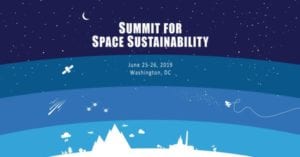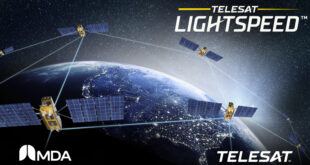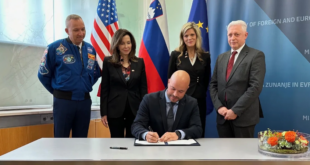
By Robin J. Frank
The adoption of the Long Term Sustainability (LTS) Guidelines “is the most significant output of COPUOS [Committee on the Peaceful Uses of Outer Space] in the last decade, and the most significant output promoting space sustainability,” said Peter Martinez quoted in Breaking Defense, who chaired (until recently) the COPUOS Working Group on Long Term Sustainability that developed the guidelines over the last eight years at the Secure World Foundation’s inaugural Summit for Space Sustainability in Washington, DC, on 25 June 2019.
Ambassador Andre Rypl of Brazil, the Chair of this COPUOS session, commented on Friday, 21 June 2019, that, “we started this session talking about how we at COPUOS make the impossible possible. We have done just that. The guidelines on [LTS] of outer space activities and, more importantly, the decision to move forward and advance the concept of sustainability in space, is probably the most significant achievement of COPUOS in a decade.”
Mr. Martinez became the Executive Director of the Secure World Foundation (SWF) in December 2018. One of the SWF’s Summit’s foci is the LTS Guidelines, their implementation, and future development.
The LTS Guidelines (2019 COPUOS Report Annex 2, AC.105/L.38/Add.4), defines “long-term sustainability of outer space activities” as, “the ability to maintain the conduct of space activities indefinitely into the future in a manner that realizes the objectives of equitable access to the benefits of the exploration and use of outer space for peaceful purposes, in order to meet the needs of the present generations while preserving the outer space environment for future generations.”
The 21 Guidelines provide non-legally binding guidance on: (1) the policy and regulatory framework for space activities; (2) safety of space operations; (3) international cooperation, capacity-building and awareness; and (4) scientific and technical research and development.
Discussion about the LTS Guidelines during the COPUOS was spirited. While Russia, China and a number of the G-88 opposed their adoption when the meeting began, by late in the meeting Russia was isolated. Various nations supported the LTS Guidelines. For example, on 13 June 2019 the United Kingdom submitted to COPUOS a paper “Operating in Space: Towards Developing Protocols on the Norms of Behaviour” (A/AC.105/2019/CRP.12). Key take-aways from the paper include that space is rapidly commercializing and democratizing and the increasing number of government and commercial operators in the domain is making cooperation and communication more important than ever. Moreover, China — usually supportive of Russia at COPUOS on LTS – did not engage at this meeting. Thus, at the last minute, Russia agreed to the adoption of the LTS Guidelines last week. One reason consensus was achieved is that the U.S. and other states agreed to continue a LTS Working Group in the Scientific and Technical Subcommittee (STSC) for five more years. The General Assembly will look at them in December and is expected to endorse them.
History of LTS Guidelines
The Committee on the Peaceful Uses of Outer Space considered different aspects of the long-term sustainability of outer space activities for many years. Building on previous efforts, in 2010 the Scientific and Technical Subcommittee began considering as an agenda item the long-term sustainability of outer space. COPUOS established a Working Group on the Long-Term Sustainability of Outer Space Activities, the objectives of which include identifying areas of concern for the long-term sustainability of outer space activities, proposing measures that could enhance sustainability, and producing voluntary guidelines to reduce risks to long-term sustainability. The Working Group and its expert groups addressed thematic areas including sustainable space utilization supporting sustainable development on Earth; space debris, space operations and tools to support collaborative space situational awareness; space weather; and regulatory regimes and guidance for actors in the space arena.
In June 2016 COPUOS agreed to a first set of 12 guidelines for the long-term sustainability of outer space activities. However, in 2018 work to agree on nine additional nine guidelines was not successful.
Legal Status of the Guidelines
The LTS Guidelines state, in relevant part that, “the existing United Nations treaties and principles on outer space provide the fundamental legal framework for the guidelines. The guidelines are voluntary and not legally binding under international law, but any action taken towards their implementation should be consistent with the applicable principles and norms of international law. The guidelines are formulated in the spirit of enhancing the practice of States and international organizations in applying the relevant principles and norms of international law. States and international intergovernmental organizations should voluntarily take measures, through their own national or other applicable mechanisms, to ensure that the guidelines are implemented to the greatest extent feasible and practicable,in accordance with their respective needs, conditions and capabilities, and with their existing obligations under applicable international law.” (Emphasis added)
Such guidelines are known by various different names – “gentlemen agreements,” non-codes of conduct, etc. The approach taken with the LTS Guidelines is consistent with the approach taken by previous COPOUS Guidelines, Declarations and Principles, such as the 1996 “Benefits Declaration.”
It is also consistent with work done in other international groups. For example, the 1987 Missile Technology Control Regime (MTCR – http://mtcr.info/) aims to limit the spread of ballistic missiles and other unmanned delivery systems that could be used for chemical, biological, and nuclear attacks. Seven states (Canada, France, Germany, Italy, Japan, the UK, and the U.S.) created the MTCR and today there are 35 members (including most recently India), as well as several states (including China) that abide by the MTCR guidelines. Also, the Hague Code of Conduct against Ballistic Missile Proliferation (HCOC – http://www.hcoc.at/) is the result of efforts of the international community to curb ballistic missile proliferation worldwide and to further delegitimize such proliferation. The HCOC is the only multilateral transparency and confidence-building instrument solely concerning the spread of ballistic missiles. Like the LTS Guidelines, the MTCR and the HCOC are politically-binding commitments. There are presently 138 signatories to the HCOC.
Conclusion
The LTS Guidelines are important to the broader space community. These consensus-based discussions include established and emerging space actors, private corporations, and non-governmental organizations (NGOs), and represent a wide variety of all those who utilize space or are affected by space activities. The topics and issues addressed are quite comprehensive and COPUOS is one of the few international fora that has this wide breadth of discussions and viewpoints represented. The decisions made in COPUOS will affect all space actors. Due to the unique physics of space, the activities of one space actor can have effects on many others, so it is crucial to understand best practices that are agreed upon by the international community.Because COPUOS works by consensus, any decisions made on these guidelines and their content are indicative of international thinking and views on the issues.
With the increasing democratization of space comes a responsibility and need to keep space sustainable. More players in the game naturally leads to more launches to coordinate, more objects to track, more debris to avoid and more critical systems at risk. Debris, for example, can be perilous to satellites and easily created through poor mission design or negligent use of space assets. As the number of launches increases, so too will the amount of debris as well as the likelihood of a catastrophic collision. Achieving sustainability will require a global effort and can be realized through efforts such as cataloguing space objects, mitigating debris creation and sharing relevant operational data. A sustainable environment means that current actors can continue to operate with minimal disruption, while new space-faring nations and companies will be assured that the domain will remain accessible in the future. As operating norms are established, it is important to ensure that the rules of the game will be fair and allow new actors the opportunity to grow.
Participants at the SWF Summit for Space Sustainability are discussing many of these issues, and SpaceWatch.Global will be reporting on them in the coming days.
SpaceWatch.Global is proud to be a media partner of Secure World Foundation’s Summit for Space Sustainability. SpaceWatch.Global is generously supported by the Secure World Foundation.
Robin J. Frank retired from the U.S. National Aeronautics and Space Administration as Associate General Counsel for International Law in December 2018. Prior to that she held international law positions at the U.S. Departments of Defense, Justice, and State and spent two years as the Legal Adviser to the U.S. Ambassador, Embassy Panama. She is currently writing and speaking on various international law, including space law topics – including planetary defense, deep space exploration, the International Space Station and Beyond and lunar heritage sites. She is a member of the International Institute of Space Law and the American Society of International Law. She is a graduate of the New York University School of Law and licensed to practice in New York and Connecticut.
 SpaceWatch.Global An independent perspective on space
SpaceWatch.Global An independent perspective on space




